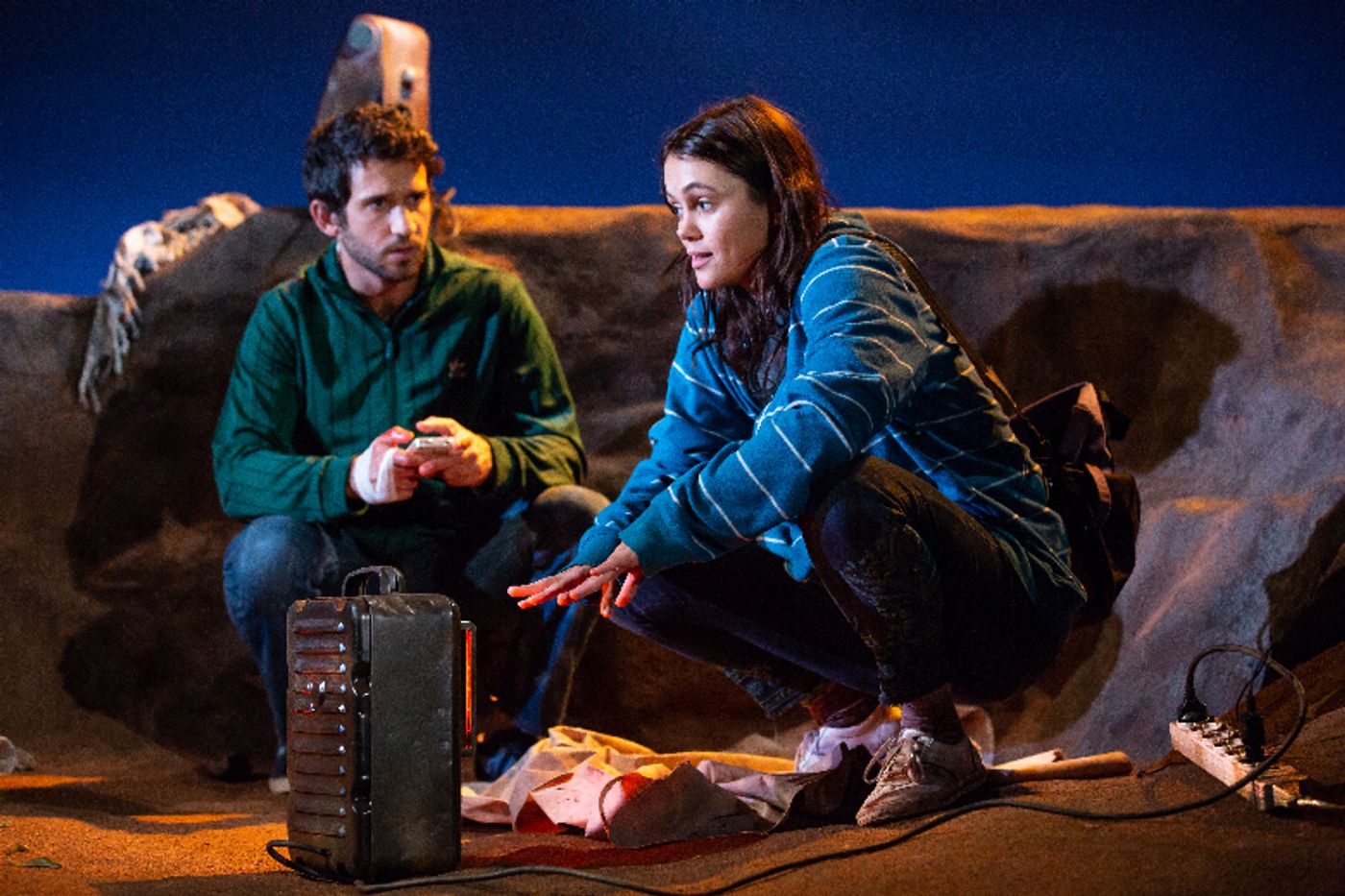Review: Refugee Politics Leads To Sexual Politics In Sylvia Khoury's Absorbing POWER STRIP
There's more than one meaning to the title of Sylvia Khoury's relevant, absorbing and quite heartbreaking drama, Power Strip, being granted an excellent premiere production by Lincoln Center Theater's LCT3.

(Photo: Jeremy Daniel)
At first, the most noticeable one is the multi-use outlet that supplies electricity through a lengthy collection of extension cords that 20-year-old Syrian Yasmin (a forceful and compassionate performance by Dina Shihabi) uses to power an electric heater and keep her phone charged on the small patch of dirt and rock she calls home at the outskirts of an overcrowded and underserved refugee camp on the Greek Island of Lesbos.
For those who have escaped the dangers of their country's civil war, daily life now means spending most of every day waiting on long lines to acquire food, medical attention and legal help to find a new life in a welcoming nation. In an atmosphere where individual survival takes precedence over any sense of community, Yasmin uses merciless fighting skills and a sharp knife to protect everything that is hers.
This is demonstrated when newcomer Khaled (sympathetically naïve Darius Homayoun), tries stealing her heater as she sleeps. Yasmin cuts his hand and then, as she's saving up for passage to Germany that can be supplied by a local fixer, offers to use the skills she learned in medical school to treat his wound for a fee of five euros.
When Khaled explains that he's trying to keep his diabetes-stricken mother from dying, Yasmin softens a bit and, for another fee, tells him where he can get a heater. Realizing how unprepared he seems to care for his mother, she explains the rundown on how to obtain daily necessities. It's only after sensing she can trust him that she asks him to stand guard for her whenever she showers, which is always a dangerous time for women in the camp.
Rather than addressing the political issues of protecting those escaping hardship from their home countries, Khoury's play is fully concerned with sexual attitudes (exclusively heterosexual and presumedly cisgender) in a patriarchal society where human actions cannot be effectively policed.
As Yasmin and Khaled's relationship shows signs of growing beyond friendship, we also see flashbacks of Yasmin and the man who was her finance when she lived in Damascus (Ali Lopez-Sohaili). Toward the end of the play, another man enters into the picture (Peter Ganim).

(Photo: Jeremy Daniel)
One of the three, when feeling aroused, excuses himself from Yasmin's presence for fear of not being able to control himself. One seeks comfort from her to help ease the pain of losing his wife. Another tries romancing Yasmin with his fantasy of absolving her from her past actions through the respectability of marriage.
Yasmin's own emotional and sexual desires, and the actions she takes to satisfy them, are addressed as well.
The focus is on the respect and the value a male-dominated society places upon women who retain their virginity until marriage as compared with men who are sexually active outside of that bond. The attitudes concerning women who are raped or who engage in sex work as compared with the men who rape or who purchase their services are also prominently addressed.
Both the play, and director Tyne Rafaeli's staging, are appropriately blunt, eschewing subtly for urgency. The design team of Arnulfo Maldonado (set), Dede Ayite (costumes), Jen Schriever (lighting) and Matt Hubbs (sound) combine for an effective representation of the unforgiving surroundings.
While Power Strip doesn't say anything that a woman, or a compassionate man who listens to women, doesn't know, it is still a striking dramatization of horrific truths, not only for women trapped in the middle of headline-making political conflicts, but also for women leaving Lincoln Center after a night of fine theatre and making their way home.
Reader Reviews

Powered by
|
Videos

